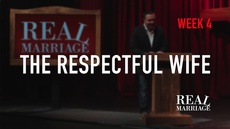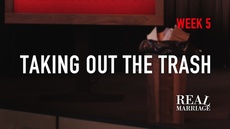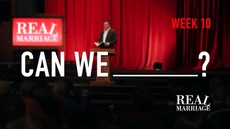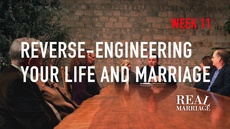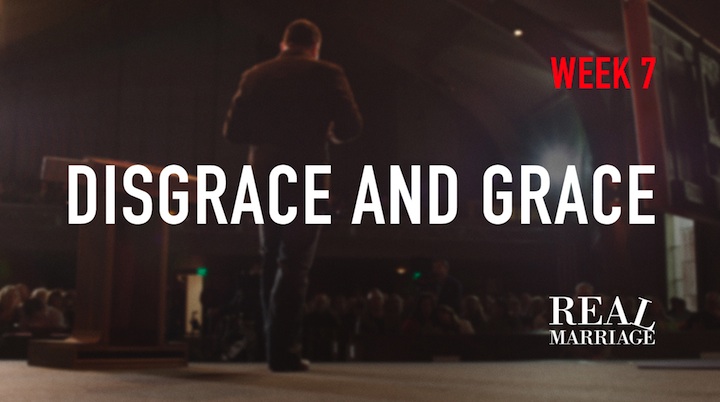
Can’t see the video? Download and install Flash to be able to view. Get Flash Here
Sexual assault is an epidemic: 1 of 4 women and 1 of 6 men have been assaulted—including Pastor Mark’s wife, Grace. Sin would leave us as shamed, defiled victims, but in Jesus, we are cleansed from all unrighteousness if today we turn from sin and trust in him. Two key books on assault from Mars Hill leaders: Rid of My Disgrace and Redemption .
Father God, I ask that I’d be able to teach well today. God, I hope that you would help Mars Hill to be a place where hurting people are served. And I pray, Lord God, for those who will hear this sermon, some helping them along a journey toward healing, and those who will start a journey of healing, but with the first steps being incredibly painful. God, I thank you for my wife’s bravery in writing the seventh chapter of the Real Marriage book, and I thank you that I have the great honor of teaching that content today, and I thank you, Lord, that she is a great gift that you’ve given to me. And so, God I pray that this time would be focused on helping others and that you would allow me to finish this sermon. Amen.
This is the one sermon I never wanted to preach. Grace and I were sitting on a couch. It was late one night, just hanging out, and we were just visiting, nothing particularly deep. I started asking her a few questions about some issues in her past and experiences that she’d had, and she just answered them matter-of-factly, just very casually, very unemotionally, and I just started bawling.
And she was taken aback. She couldn’t understand why I was emotional. I don’t get emotional very often. Almost always, if I do, it’s because women and children are in danger. And she said, “Oh, I’m so sorry.” I said, “No, don’t be sorry. You didn’t do anything wrong. You didn’t say anything wrong, but you’re a sexual assault victim.” And she’s like, “What, me? What are you talking about?” I said, “Yeah, what you just explained was textbook sexual assault.”
All of a sudden, everything in our marriage and relationship made sense. We had been married, at that point, for, gosh, it was six years ago. This year, we’ll celebrate our twentieth wedding anniversary. So, we were married at that point, maybe thirteen or fourteen years. And we dated for four and a half years before we married, so we’d been together seventeen or eighteen years. I mean, I’d known Grace since high school, and we were good friends.
And now I knew her. I knew everything. And she hadn’t concealed anything, so she wasn’t ever dishonest with me. She just never saw it for what it was. And I think that’s pretty common with victims not only of sexual assault, but of other kinds of assault, as well, that sometimes you tend to have a clearer perspective seeing someone else’s life, but you interpret the data in your own life differently.
Sometimes there’ll be repressed memory, where you don’t remember certain things, and then something will trigger it, or disassociation, which is a clinical term, where somebody who’s being assaulted in some particular way, they’ll disassociate. They’ll sort of mentally check out, just as a coping mechanism. And sometimes people are just not emotionally ready to remember and deal with certain trauma or trouble. I believe that God doesn’t give us more than we can bear, and for those who come to understand some things that have been done to them, sometimes it is because they’re finally at a place in their maturity in Christ that they could handle it. And so, in some regards, I guess it’s an encouragement, meaning we’re finally ready to deal with this.
Well, it was one of those moments, where I knew what had happened to my wife, and . . . and it was devastating. Because for me, I’m like a lot of you men, I’m a defender, protector. The safety of my wife and kids is the highest priority, and to realize that I wasn’t there until seventeen—and some things happened to her before seventeen, before I’d met her—it really bothered me that I wasn’t there to protect her. It still does.
So we started reading, and talking, and praying, and trying to figure out, “What do we do now?” I had Grace start journaling out all of the related experiences in her life, because she’d never really thought about it. She’d have a thought here or a grief moment there, but the business of life would just sort of compel her to proceed forward. So, I said, “Honey, I really need you to take a couple of days.” I put her in a safe, quiet hotel and stayed in contact with her, but I took care of the kids and took care of the house and said, “Honey, I just need you to focus and journal this out, and think this out, and pray this out, so we get an idea of what exactly we’re dealing with.” Because she’d never really given herself time to process and to grieve.
Then we started studying and looking for ways to work out what had happened to her. And we met a couple of times with a biblical counselor. “Okay, what do we need to do and not do? What’s a good course of action for us, so I can love, and serve, and help my wife?” And in the grace of God, some years later—I mean, our friendship is great. Our marriage is really fantastic. It kind of was a revealing moment at Christmas, when, with the kids, we were all in a circle, and we were talking and praying, and I asked each of the kids, “What are you most thankful for?” And my oldest daughter, she smiled and she said, “I’m thankful that you and Mom are never going to get divorced, because you’re best friends.” And that’s where we’re at.
That being said, when it came time to write the Real Marriage book, Grace really wanted to help people, and she really loves people, and she’s very brave, and she wanted to basically say, “If I’m honest, then other people can be honest, and if this has happened to other people, I want to help them and encourage them to get help.” And so her motives are very good and very, very pure, and I really appreciate her courage. So, the subject matter for this sermon is going to be the content that she wrote.
I’ll start by doing something that I think is important, and that is defining sexual assault. It comes from this book, Rid of My Disgrace by Justin and Lindsey Holcomb. He’s a pastor here at Mars Hill and runs Resurgence for us. His wife, Lindsey, is also a leader in the church. She’s a deacon, and she was a rape crisis clinic case manager, and he taught women’s studies at the University of Virginia and is a specialist in sexual assault and domestic violence. Grace and I actually asked them to write this book, because we wanted to have, from our church, a good Bible-based, Jesus-focused resource to help people who have been sexually assaulted. And we love that book, and, you know, endorsed it, and all of that, and are really honored that that comes from Mars Hill Church.
Their definition is, “Any type of sexual behavior or contact where consent is not freely given or obtained and is accomplished through force, intimidation, violence, coercion, manipulation, threat—” hold it right there, guys— “deception, or abuse of authority.” So, that’s what we’re talking about.
It’s very important, because it used to be that the word “rape” was used a lot, and it still is, but this is a larger, legal, clinical definition, and it’s important that as you look at your life, or your spouse, or people you know and love, that you understand what has happened and have the right language. We don’t want to falsely accuse anyone; at the same time, we don’t want to falsely excuse anyone.
And it manifests itself in three ways: “The ‘acts’ can be physical, verbal, or psychological.” In the age of bullying and the Internet, in the age of certain inappropriate speech and conduct, it just, it can be physical contact that connotes sexual assault, but it doesn’t necessarily have to be. It also can be verbal and/or psychological.
Some of you will ask, “Man, a whole sermon on this? Why is this necessary? I’ve been to a lot of churches, and I’ve not heard them talk about this.” I would say, I love them, but that’s their failure. I was talking with a very well-known pastor of a decent-sized church, and he asked this question some years ago of me. He asked, “Why do you guys talk about sexual assault so much in your church?” Well, part of it is, it’s my wife’s story. Part of it is, as you’ll see in a moment, it’s epidemic.
I said, “Well, isn’t it an issue in your church?” And at the time, I think he had eight hundred people. He said, “Well, I know of two or three women who have been sexually assaulted, but it’s not a big issue at our church.” I said, “You’ve not done your homework. You don’t know your people. You are ignoring a problem and assuming there isn’t one. That means you have a culture in which the people can’t be honest about what has been happening to them and get the help that they need.” I said, “So, it’s not that you don’t have a problem; it’s that you’re ignorant of a crisis.”
And, really, that’s the issue, that sexual assault is an epidemic. It’s one in four women. How many women do you know? One in four. Statistically, the younger they are, the more likely it is. It’s also true for one in six men, and men are highly unlikely to report it for reasons of shame and embarrassment, and so it’s not just women.
Ten to fourteen percent of wives are assaulted by their husbands, which means some women are not only victims; they’re married to their abuser, which is a situation I would liken to torment. Abuse is what happens when something is done to you, but you escape. Torment is where it keeps happening to you, and you’re trapped. For some women, marriage is torment. They live with their abuser. And it wasn’t actually until the ’70s that the laws even began to recognize marital sexual assault, that it was even a crime for a man to abuse his wife.
Assault is also more common in cohabitation than in marriage. And some of you say, “That’s why I don’t want to get married. I just want to live with my boyfriend.” A boyfriend is far more likely to sexually assault a girlfriend than a husband is to assault a wife.
And here’s the staggering statistic. Only 5–40 percent of cases are ever actually reported. Grace’s would be an example. It’s never been reported, not criminally speaking. So, you look at the underreporting. Well, statistically, what that means is a large percentage of women and men who call Mars Hill Church “home” have been sexually assaulted.
What that means is, if it’s not part of your story, it is part of the story of someone you know. I mean, how many women do you know? How many men do you know? How many do you know closely, and intimately, and personally? Well, statistically, you know a lot of victims, and you probably don’t know that they’re victims, because sometimes they don’t have the language to understand what has happened to them, or the shame has caused them to not really talk about that.
So at Mars Hill Church, we want to be a place where it’s safe for people to be honest about what has happened, so that they can get hope, and help, and healing through Jesus and his people. It’s a big part of what we do.
I’ll just say this practically. I see it undergirding lots of issues. When we deal with people who have drug problems, alcohol problems, sexual addiction problems, major depression problems, not always, but oftentimes, an underlying cause is a past sexual assault. It’s amazing how this epidemic manifests itself in other kinds of suffering.
Now, what happens to those who are assault victims—and this can be sexual assault, physical assault, various kinds of abuse—what tends to happen is they have, oftentimes, basically, an identity crisis, like, “Who am I?” And so Grace rightly communicates in the chapter that there are four masks that they will wear, and this is an identity that they assume. And like an actor or an actress reading a script and playing a role, they will try to cope with what’s happened to them by acting out in one of these four ways.
The first is a good person. The underlying logic is, basically, “Something very bad happened to me, but I’m a good person. They’re a bad person. I’m a good person. They did a bad thing, so I’m going to do good things. I’m a good person.”
These people tend to show up early to work, stay late, work hard, super faithful, volunteer for everything, absolutely dependable, sometimes very organized, because it’s an issue of control. They felt like much of their life was out of control, and they want to keep as much of it as possible under their control. These are people who are moral, they’re obedient, they’re compliant, they’re dependable, they’re reliable. They’re good people outwardly.
It’s not bad to be good, but the motive is bad for them being good. They’re trying to show, “I’m a good person, and what happened didn’t affect how good I am.” Sometimes it’s the people who volunteer the most, and give the most, and serve the most that are hurting the most, and they’re hiding.
Number two, there’s the religious person. These people make everything incredibly, overtly spiritual. These are the people that it’s always out-of-context Bible verses. They’ll talk about Satan and demons and the sovereignty of God, and “he’s going to work it all out,” and “when he closes a door, he opens a window,” and “greater is he who is in you than he who is in the world,” and “I’m more than a conqueror in Christ.”
And you ask them, “How are you doing?” They’ll say, “God works out all things for the good of those who love him.” It’s like, “You didn’t even answer my question. You’re using theology as a fig leaf to hide behind. I can’t even know you. I know what you think; I don’t know who you are.” And sometimes they mean well, and sometimes they love the Lord, but they just, they just don’t know what to do.
Sometimes it’s even an error in the way the gospel is presented, because sometimes the gospel is presented solely as, “If you sin, Jesus died. Tell him your sin. He’ll forgive you.” True, but what about, not just the sins you’ve committed, but the sins that have been committed against you? What do you do with those? You can’t pray, “Dear God, please forgive me for being raped,” because you didn’t do anything. You’re the victim, not the perpetrator of the offense.
But some people become incredibly religious, and I would say some of the most devoutly religious, hyper-spiritual people that Grace and I have ever dealt with, as we get to know them, they’ve been assaulted, and they’ve not really worked that through.
There’s the party person. One gal in a tragic counseling appointment early on in my ministry articulated it most devastatingly. I still pray for her often and recently bumped into someone who knows her, and she’s not walking with Jesus, but people are still talking to her over a decade later. She was an assault victim and a young woman, probably early twenties, if memory serves me correct, and I was meeting with her.
She was just doing some really outrageous things that were very dangerous. And I remember asking her, I said, “Why do you do this?” And she looked at me, and she said, quote, “I’m a dirty girl, so I do dirty things.” That’s what her grandfather made her say, when he would leave her room at night.
And she decided that that would be her identity, so she would be the life of the party. She’s gregarious, hilarious. She’s fun to be around. She’s got the best sense of humor ever, but everything’s a joke, and she’s always ready to just put a drink in her hand and let her be the center of attention.
It’s not a sin to have a good sense of humor, and it’s not a sin to go out and, you know, enjoy people and their company, but for her, it’s tragic. Some of you are like that. Everything is a joke. You start talking about personal things, change the subject, throw out a punch line. “Ah, let’s go do something fun. Why are you so serious?”
Number four, there’s the tough person, and the tough person has learned, “Somebody got close to me and really hurt me. I’m going to make sure nobody ever gets close again.” They could be physically intimidating. They can be emotionally intimidating. They can be verbally intimidating, like, “You keep your distance.”
Sometimes, they’re just cold and aloof. You know, like, “Man, I don’t even know that person. They don’t open up at all.” Other times, there’s an aura about them, like, “Don’t get too close.” If you start to impose in any way that they feel uncomfortable, you are going to pay.
How about you? For those of you who are assault victims of various sorts and kinds, you know, what mask do you wear? What role do you play? What identity have you assumed?
When it comes to our identity, our identity determines our testimony. Who we think we are determines, really, how we live. And there are really only three options. There’s what I’ve done, what they’ve done, or what God’s done. “If it’s what I’ve done, well, then I’m going to try to be a good person or a religious person, and I’m going to try and make myself a better person.” If it’s what they’ve done, “I’m going to be a party person or a tough person. Well, I’m damaged goods. I may as well have fun,” or “I was hurt once, but I’ll protect myself from here on out.” Your identity comes either from what you’ve done, what they’ve done, or what God’s done.
So, how does Jesus play into all of this? At this point, we don’t have good news, right? You need some good news. So far, all we’ve got is news. I want to tell you three things related to Jesus, and that is, number one, that Jesus forgives all sin.
So, some of you are going to hear this, and you’re going to say, “I’m not the victim. I’m the sinner.” Or maybe you’re both. Maybe, “Something was done to me, and then I turned around and did something to someone else,” or “Something was done to me, and I’ve just been bitter ever since.” What do you do with that?
First John 1:7–8, “If we walk in the light—” and this is about openness, and honesty, and authenticity, which requires a lot of humility to say, “Okay, here’s who I am. Here’s what I’ve done.” It’s being honest and transparent.
One of the reasons I admire Grace so much for writing the chapter in the book and being honest about her story is she’s walking in the light. She’s saying, “Here’s what happened.” And in so doing, she’s inviting other people to do the same. And it’s been pretty remarkable. The feedback we’ve gotten has generally been, particularly on this issue, super encouraging.
It says, “If we walk in the light, as he is in the light, we have fellowship with one another.” As people are honest, they get closer, as opposed to faking it, playing roles, hiding behind fig leaves. As you’re honest and say, “Here’s what I’ve done, and here’s what’s been done to me—” and you do this with your spouse, you don’t necessarily do this—you don’t do this with strangers, or dangerous people, or your abuser, but you do this with your spouse, or your parent, or a biblical counselor, or a godly church leader, or a trustworthy friend. You have fellowship. You feel closer.
It’s been really interesting this week. Emotionally, this has been a pretty shipwrecked week for me for a whole lot of reasons, but all leading up to having to teach—or getting to teach this content. But I’ve had multiple women walk up to me in stores, in coffee shops, look me in the eye, start crying, and say, “Tell Grace, ‘Thank you for chapter 7.’” And they feel a fellowship with her. One was a young woman who said, you know, “That’s my story, and Grace told hers and got help, so I’m telling mine, so I can get help.” Well, praise God for that.
So as we talk about sin we’ve committed and sin that’s been committed against us, we walk in the light. We have fellowship with one another. We actually build relationships. We get beyond the, “How are you doing?” “Great. How are you?” “Great.” “Well, we’re both great. Glad that’s over with. Have a nice life.” One of the guys on the film crew, before the sermon, he asked, “How are you doing?” I said, “I’m not going to lie to you, not well.” He was like, “I understand.”
“If we walk in the light, as he is in the light, we have fellowship with one another, and the blood of Jesus his Son cleanses us from—” how much sin? “All sin. If we say we have no sin—” “Oh, I’ve not done anything too bad, and nobody’s done anything bad to me.” “We deceive ourselves.”
You can actually start to believe that lie. “Nothing bad has happened to me, and I haven’t done anything real bad to them, so, you know, thankfully, it’s not a big deal. Our life is pretty easy. Move along with the needy people, who’ve got big issues, because ours is pretty simple.” We deceive ourselves. Satan, in the Bible, is called a deceiver. People can deceive themselves, as well.
“And the truth is not in us.” We’re not telling the truth. So, when it comes to the sin we’ve committed, and the sin that’s been committed against us, we need to be truthful about all of it, not diminish it. People like to partially confess their sin, or they like to partially confess sin that’s been committed against them, because of shame. They don’t want to tell the whole truth. But God asks us to tell the whole truth, so that we can deal with reality and not be self-deceived.
The key is that “the blood of Jesus his Son cleanses us from all sin.” The idea here is this, that because of the sins we’ve committed, we all deserve death and hell. And I know it’s not popular to say that, and there’s a lot of places that’ll tell you, “You’re basically a good person, and don’t really worry about it. God loves everybody. You’re going to be fine.” Let me tell you this: Everybody is a bad person and headed toward hell at breakneck speed. Hell is the active wrath of a just and holy God against evil.
And I praise God that he doesn’t look at this earth and all of the injustice, tyranny, oppression, rape, assault, and neglect, and say, “Those are some good people.” I’m glad that God looks at it, as a father would, toward children that were being assaulted and says, “That really grieves and angers me, and I cannot tolerate that forever. It will come to an end.”
Some of you are in grave danger. You are headed toward hell. You are living in the path of the wrath of God. And the good news is that God comes as Jesus Christ. God comes as a man. He lives as we do, yet without any sin, and he substitutes himself on the cross, and he suffers and dies in our place for our sins, so that at the cross of Jesus, justice and mercy kiss, and our sin is paid for through the blood of Jesus, through the blood of Jesus.
So, friends, let me say this. There will be justice for us all. It’s either at the cross of Jesus or in hell, and no one is getting away with anything. And for those of you who are victims of assault and abuse of various sorts and kinds, in forgiving someone, you’re not saying it’s okay. What you’re saying is you’ll leave it in the hands of God. You’ll leave it in the hands of God. And that is either Jesus died for it, or they will die and go to hell for it. But either way, it will be dealt with.
We’re all sinners by nature and choice, and we need to know that our sin is such a big deal that it required the death of God. So, it’s a great travesty for even a victim to say, “Yes, what happened to me did, in fact, occur, but it wasn’t that big of a deal.” Yes, it was. God had to die for it. That’s how big of a deal it is. But Jesus can and does forgive all sin. It doesn’t matter what you’ve done. Jesus can and does forgive all sin, even the horrific sins of sexual assault; yes, even toward women; yes, even toward children. He doesn’t just forgive people; he changes them so that they stop sinning and start serving.
Do you know Jesus? Is your sin forgiven, or are you living in the path of the wrath of God? Jesus does forgive all sin. But we need to talk about it. You need to talk to God about it. That’s that word, “We walk in the light.” It’s being honest with God, it’s being honest with others; and if you’re married, it’s being honest with your spouse. Who are you, and what have you done?
Number two, Jesus takes all shame. One of my great frustrations with gospel presentations is that it is said, “You’re a sinner, and if you repent of sin and trust in Jesus, he will save you.” That’s absolutely true, but what happens to those who are not just the sinners, but the victims of others’ sin? What do you do? What do you do when you’re the one who was beaten, when you were the one who was betrayed, when you were the one who was molested, when you were the one who was raped? What do you do? You don’t repent of your sin. You’re the victim of sin. You didn’t sin. You were the victim of sin. What do you do?
And that is that Jesus not only forgives sinners; he cleanses victims. And what he does, he takes their shame. Because you know what sin produces? Shame. And this can be sin we’ve committed or sin that’s committed against us. It creates shame. We see this early on in Genesis 2, where God creates our first parents perfect. And it says that they were naked without any what? Shame. So, before sin enters the world, there’s no shame. As soon as they sin, they cover themselves, they hide from one another, and they hide from God.
Do you know what that is? Shame. “I don’t want God to see me. I don’t want you to see me. I don’t want to be known.” Because intimacy is “into-me-see,” and they just don’t want to be seen. People who are ashamed, they tend to withdraw, retreat, hide, or they’ll hide behind, as I said, a mask or an identity that they assume and presume, as an effort of pretending who they are and defending the shame they feel.
How many of you feel shame by what you’ve done? How many of you feel shame by what has been done to you? You just feel dirty. Every woman I’ve ever counseled, who is a sexual assault victim, the first thing she did, after being assaulted, was what? Take a shower. I can’t remember a woman who hasn’t said, “And I had to go take a shower.” What is that? It’s that they feel, to use the language of Genesis 34, in the story of Dinah, “defiled,” unclean, dirty.
Hebrews 12:1–2, “Let us also lay aside every weight.” Is your shame, the sin committed against you, does it feel like a weight? Does it feel like a taxing burden, like an emotional anchor? “And the sin which clings so closely,” does it always feel like it’s right there? “And let us run,” not just limp, but, “run with endurance,” that’s perseverance, keep going, “the race that is set before us,” that God has purposed for us in our life to not only heal but to help others be healed, through Jesus Christ.
“Looking to,” who? “Jesus.” See, if you’re just looking at yourself as a victim, or just looking at your abuser, and you’re not looking to Jesus, you’re not going to be able to run. You’re just going to limp for the rest of your life. “The founder and perfecter of our faith, who for the joy that was set before him,” Jesus, though it was painful, and he shed his tears, he joyously saved sinners. He joyously takes shame, “endured the cross, despising the—” What? “Shame.”
We have a God—for those of you who struggle with the shame of the sin that’s been committed by you or against you—we have a God who has come into human history and has, of his own volition, chosen to be shamed and victimized. Jesus was victimized—emotionally, verbally, spiritually, physically abused. He was assaulted. And he went to the cross, and he was shamed. They said horrific things about his character that were completely untrue. He was stripped, altogether—or almost altogether—naked, I mean, so shameful for a man. He was condemned as a criminal. He was beaten. He was cursed. He was spit upon. He was mocked. He was crucified. He was shamed.
But the Bible says that he went to the cross, despising the shame. Some of your translations will say, “scorning the shame.” You sinners need to know that when Jesus went to the cross, he took your sin. You victims need to know, when Jesus went to the cross, he took your shame. And they both died in the body of Jesus that day.
So there is forgiveness of sin, and there is taking of shame in the person and work of Jesus. I really, desperately, as your pastor, want you to know and embrace this great truth, otherwise, you will feel forgiven but ashamed, and you will limp along, rather than running the race that is set before you.
Number three, Jesus cleanses all defilement. The Bible, between the Old and New Testament, has about a dozen words—defilement, filth, uncleanness—these are all words denoting the staining effect of sin, particularly that committed against us. If you read the Old Testament, and you wonder, “Why do they have to keep cleaning their home and have cleansing rituals and all of this mechanism by which to rid their homes and their diets and their garments of filth and dirt?” It’s all showing that sin is like that. Sin gets into everything, and it makes it dirty, and it makes it defiled, and it makes it disgusting. And as we labor to keep our bodies and homes clean, so Jesus needs to cleanse us from all of our unrighteousness. Some of you feel very defiled, damaged, broken.
Here’s what 1 John 1:9 says, “If we confess our sins—” Again, we talk about it with God and godly, trustworthy people, beginning with our spouse, I would hope and pray. He is what? “He’s faithful.” I can tell you, from my life, my wife’s life, and hundreds of people that we’ve been able to serve in varying ways on these issues over the years, he is faithful.
“—to forgive us our sins—” So, whatever sins you’ve committed, Jesus can and will forgive, if, today, you turn from sin, trust in him. “And” to what? “Cleanse us.” See, the rape victim, who climbs in the shower, what they really want is Jesus, but they just don’t know how to get clean to the level of the soul, so they go as far as they can, which is cleansing of the body.
“To forgive us our sins and to cleanse us from all unrighteousness.” And for you victims, I want you just to memorize, “cleanse from all unrighteousness,” all of it. And what that means is you may even have repressed memories or disassociation, and you’re doing something, and all of a sudden a memory comes back. And you think, “Man, I thought I dealt with this, but it’s back, or it’s something I didn’t know, and now I do know.”
I talked to a victim, a woman, not long ago, and somebody just walked up behind her and just, it was a friend that just put a hand on her shoulder, and she absolutely fell to the floor weeping bitterly, did not know why. It triggered a memory that she had not remembered in years, of something that had happened to her that was assaulting.
It’s cleansing from all the unrighteousness, all of it. And the way this works itself out in the Bible is symbolic acts. The people of God are often told, “Wash your clothes,” to show what Jesus does. I want you, every time you do your laundry, just to remind yourself, Jesus cleanses from all unrighteousness. Every time you do your dishes, Jesus cleanses from all unrighteousness. Every time you sweep or vacuum the floor, Jesus cleanses from all unrighteousness. This is shown, as well, in Christian baptism, that Jesus lived, died, was buried, and rose. And as water cleanses us from filth, Jesus cleanses us from all unrighteousness.
As well, in the Bible, the people of God often wear what color? White. Do you ever wonder why? It’s to show that Jesus cleanses from all unrighteousness. So, even the church is typified in Revelation 19 at the end of the age as like a bride. Jesus is like a groom, and there’s this enormous celebration and wedding feast that ends human history. And it says that fine, white linen, pure and clean, was given her to wear.
Ladies, it doesn’t matter what you’ve done or what’s been done to you. On your wedding day, you wear what? You wear white, if you are in Christ, because if you are in Christ, you are clean. That’s your identity. You’re not determined by what you’ve done or what’s been done to you. You’re determined by what Jesus has done for you, and he cleanses us from all unrighteousness.
This is why even the people of God, in the Old Testament, they would go to the temple. I’ve had the privilege of being there, at least at the site where the temple used to reside, and it’s literally a city on a hill. It’s high and exalted, and the temple is at the top of this rock, highly visible. There were certain psalms of ascent that the people would sing, as they would go to worship God and deal with sin. And at the base of the mountain, before they would ascend to worship God, singing various psalms of ascent, they would first stop, and they would wash their clothes, and they’d wash their body, and they’d put on fresh, white linen, and then they would go to worship God. Imagine seeing tens of thousands of people wearing white. That’s to remind us all: Jesus cleanses from all unrighteousness.
For those who are the spouse of an assault victim, number one, God has not given you an affliction; he’s given you a mission. Or I should say it this way: God has not given us an affliction; he’s given us a mission. I’ve got two daughters that I absolutely cherish and adore. And God has daughters that he cherishes and adores. And if he would ask some of you men to marry and love and serve those women, it is not an affliction; it is a mission that the Father has sent you on, because he’s trusting you to love his daughter with his affection. And in our selfish moments, we can think, “This is more difficult than some might experience. This is not what I would’ve hoped for.” We should, instead, thank God that he’s trusted us with such a sacred mission and not in any way view it as an affliction.
Number two, the affection and the intimacy takes longer, but it goes deeper, because for someone who has been hurt, they will be reticent, cautious to really trust someone, even their spouse. And so it will take longer, but it will go deeper, because they will trust you in a way they’ve never trusted anyone and be vulnerable with you in a way that has only been betrayed.
And for those of you who might ask, God does not cause these things to happen, but he uses them for good. God does not cause these things to happen, but he will use them for good. And that’s why Grace wrote the chapter.
Father God, as I bring Grace out, I pray for our church, that we would be a safe place, a helpful place, a healing place. God, for those who have just realized that this is their story, I pray for the time and energy it’s going to take to process this, and for trustworthy people, including their spouse, to talk about this with. And, God, it is an epidemic. It’s a growing epidemic, so we pray against the enemy, his servants, their works and effects. We pray for the power of the gospel of Jesus Christ to do its work, and we pray that the people of God would be a means by which the grace of God and the love of God is shared. I thank you for Grace’s bravery and boldness and her friendship with me. God, I thank you that I get to be her husband, and I pray for the men in the church, that are single, that we would not see them make any victims. I pray for the men in the church, who are married, that they would not make any victims. And I pray for the people in the church, men and women, who are victims, that they would know, in Christ, they are forgiven; in Christ, their shame is scorned; and, in Christ, they are clean. In Jesus’ name, amen.
Thank you for joining me, sweetie. Rather than doing Q&A today, I just don’t think emotionally I could handle that, to be honest with you, and I didn’t want to expose you to that kind of situation. So, thanks for writing the chapter. I think you did a great job, and thanks for being my friend.
Grace: Thanks for walking through this whole process with me.
I would do anything for you. I would. Let’s start with, how did it feel for you or what concerns or apprehensions did you have once, you know, we kind of understood everything, and then you started working toward getting in a Redemption Group, and talking with people, and working that through? What was that like for you?
Grace: There were a lot of fears involved. I was always a very private, quiet person, and so when God started revealing and opening my eyes to some of the things that had happened to me, it was a big deal for me to even share it with you. And so the thought of continuing to share that with people for healing was pretty frightening, and just to not keep those things private, and to think that any healing could possibly come from more discussion was confusing to me. It seemed like you could just confess it, or talk about it, and then turn the page, and you’d be fine, and that was it, but God had so much more healing to do in the process of working it through.
So, as I was entering into a group with other women, some whom I knew, some whom I didn’t really know, it was a super vulnerable place for me. There were many times, where I wanted to quit and say, “This is too hard,” and that fear of rejection from people was big for me, because of lots of relationships throughout my life, and so the thought of telling people this and then the rejection possibility that would happen.
And so just sharing and getting in that group actually was a healing process, because as we each shared our story, and things that had happened, and different aspects, it made me realize that I wasn’t alone. And I knew I wasn’t, because I had the Lord, and I had you, but there’s just something, I think, for women specifically, but for all of us in general, living in community, it really does help us want to be strengthened in that journey of healing, and so just sharing that—and the women were sharing their stories, and I couldn’t relate to every detail of theirs. They couldn’t relate to every detail of mine, but there were pieces in everyone’s story, whether it was shame or just wanting to suppress the truth, or embarrassment. There were lots of different elements that we could each relate to in each other’s stories. And so it just, it was really helpful to have people talk through that in a group setting.
For those who may be unfamiliar with it, this is why we started Redemption Groups, quite frankly. We wanted to have a Bible-based, Jesus-focused, church-connected way of helping those who have been abused, addicted, or have deep hurts and wounds, and so I know you brought it out. Pastor Mike Wilkerson, who’s a friend of mine, and you’re good friends with his wife, Trisha, who’s been a good friend to you—he wrote the book, Redemption, and it serves as kind of the basis for our Redemption Groups, and we really appreciate them doing that work for us, and we asked them to do that, so that Mars Hill could be a place where we could establish groups to help people. I think over seven hundred people have been through Redemption Groups, and at least that many in other churches, as we’re hoping to set up Redemption Groups in other churches under the leadership of Pastor Mike and others.
Maybe take a few moments and explain to people what a Redemption Group is. It’s different than a Community Group. A Community Group meets ongoing and discusses the content of the sermon. Maybe explain Redemption Groups and how they work with Community Groups.
Grace: Yeah, a Redemption Group starts out with a weekend of training and getting to hear from other leaders and people who have similar experiences, and then it goes every week for about a quarter, and it’s based off the story of Exodus in the Bible, so it’s a very biblical training, but it’s also very practical. He talks through deliverance and how God wants to deliver us from the slavery of sin, either that we’ve committed or that’s been committed against us. And then he talks through the ransom that God has already paid, so that we can experience the next topic of renewal. And all those things are throughout the Redemption Group training.
You get to continually hear real stories of people that have walked through these painful processes, and then you break off into smaller groups, that they prayerfully put people into. They have a leader and an apprentice in the group that walk people through the stories and how to talk to each other, not hurt each other more through comments, but to receive and love each other through it, so it’s a very relational process. You get to know people that you knew nothing about before. And then you continue to just walk through that process.
Then at the end, they celebrate, have a celebration time, as Mark has said, just to wear white, you know, celebrate, have a feast that we get to celebrate what God has done in the renewal process, and not that it’s ended after that quarter—you will continue, but you continue under the auspices of a new identity. You’re not the abuse victim; you are a renewed person in Christ, and he wants to continue to heal you. And so the identity piece is a huge part, getting rid of the idols and walking in your new identity in Christ.
What does it mean for you that we’ve got Redemption Groups at Mars Hill?
Grace: Oh, it means the world, because I know that people can really experience healing, and they don’t have to be stuck in shame and the pain of being a sexual assault victim. They can help other people, once they’ve been trained. It’s just, it’s a continual process for them. And, yeah, so many people don’t know what to say, when they hear of sexual assault stories, and so this is an essential part for our church to come in and love people who feel unloved. So, it means the world to me that we could have such a resource, because so many people didn’t know what to say to me, either.
Yeah. What counsel would you give for a spouse, a friend, a parent, who knows someone that this is part of their story, or somebody confides in them that this is part of their story? What would be helpful for them to say and do and unhelpful for them to say and do?
Grace: Well, I think praying for them, being a good listener, being someone they can trust, a confidante, not someone who’s going to go and spread what they’ve confided in you. Just to remind them of God’s love for them, to remind them of his desire for healing and renewal, and to cleanse from all unrighteousness. I needed to be reminded of those things regularly, because as new memories or lies try to invade during the healing process, the truth needs to be spoken, and not in just an aloof way or unfeeling way, but a way that is genuine, and even just hugging the person, if they’re okay with that, if it’s someone that’s, you know, a girlfriend to another gal, or your wife. I think those are just important ways to really help that person see that you do care.
And if they need help, help them into a Redemption Group. Help them into a community that’s trusting or a biblical counselor, if you’re not in the Mars Hill community, praying with them, praying over them, checking in on them to make sure that they’re okay in the healing process. I had many friends that just regularly would text me or call and say, you know, “How can I pray for you today? What is your struggle today?” And they would just pray for me right then, and they would pray for me throughout the weeks. Just not rejecting me was huge. And then, yeah, just being good listeners.
I think I’m going to end it there. I don’t think I can do any more.
We’re going to transition at this point. We’ll collect our offering, and that is to forward the ministry of Jesus, and we want people to get help. Since we’ve recently grown by five thousand people in two weeks, we have a whole lot of people to help, and so we appreciate your support, prayerfully and financially.
If you’re new or want to get connected, give us that visitor card, because we really want to follow up with you and do anything we can to connect to you. So, if you put that in the offering, that’ll enable us to serve you.
We’ll take Communion, which is remembering the broken body and shed blood of Jesus. The blood of Jesus cleanses from all unrighteousness. And as you take Communion, you’re publicly saying, “He died, so that I could be forgiven and cleansed.” And it’s a very powerful public identification with Jesus.
And, lastly, we’re going to sing. And singing for us, today, is a way of praying. It’s working out what the heart is feeling, through the voice. And so, as we sing, we’re praying collectively as the people of God, today, some praying and grieving for ourselves, and some for those we know and love, or some for both. And so, yeah, sweetie, if you’d be willing, maybe just close our time in prayer. I’d appreciate that.
Grace: Lord, thank you. Thank you for giving me the strength to write this story that you are still weaving and playing out in my life. Thank you that you are taking it to help other people, and I pray that you’d continue to do that. I pray that men and women who have sexual assault in their history, Lord, that they would just move toward the release from the shackles that it causes for them. Lord, I pray against the enemy’s lies and division of community for them. Lord, I pray that they would trust you as their Heavenly Father, to be their source for their identity, and their joy, and their healing. Lord, I thank you that you don’t let us just continue broken and unhealed, that you desire so much more. And so I pray for that path for all of us, in Jesus’ name. Amen.
Note: This transcript has been edited for readability.

